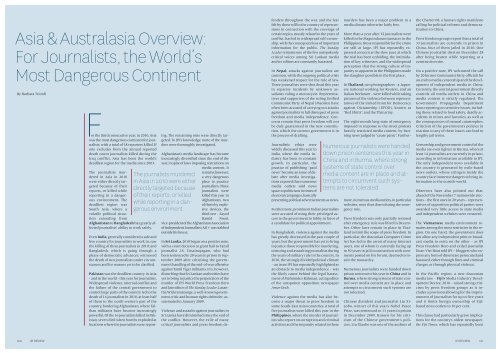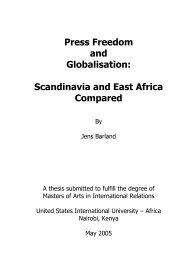FOCUS ON THE AMERICAS - International Press Institute
FOCUS ON THE AMERICAS - International Press Institute
FOCUS ON THE AMERICAS - International Press Institute
You also want an ePaper? Increase the reach of your titles
YUMPU automatically turns print PDFs into web optimized ePapers that Google loves.
Asia & Australasia Overview:<br />
For Journalists, the World’s<br />
Most Dangerous Continent<br />
By Barbara Trionfi<br />
For the third consecutive year, in 2010, Asia<br />
was the most dangerous continent for journalists,<br />
with a total of 38 reporters killed. If<br />
one excludes from the annual reported<br />
death count journalists killed during the<br />
Iraq conflict, Asia has been the world’s<br />
deadliest region for the media since 2003.<br />
The journalists murdered<br />
in Asia in 2010<br />
were either directly targeted<br />
because of their<br />
reports, or killed while<br />
reporting in a dangerous<br />
environment. The<br />
deadliest region was<br />
South Asia, where a<br />
volatile political situation<br />
extending from<br />
Afghanistan to Bangladesh has greatly affected<br />
journalists’ ability to work safely.<br />
Even India, generally considered a safe and<br />
free country for journalists to work in, saw<br />
the killing of three journalists in 2010; and<br />
Bangladesh, which is going through a<br />
phase of democratic advances, witnessed<br />
the death of two journalists under circumstances<br />
and for reasons yet to be clarified.<br />
Pakistan was the deadliest country in Asia<br />
- and in the world - this year for journalists.<br />
Widespread violence, internal conflict and<br />
the failure of the central government to<br />
control large parts of the country led to the<br />
death of 16 journalists in 2010, at least half<br />
of them in the north-western part of the<br />
country, bordering Afghanistan, where Taliban<br />
militants have become increasingly<br />
powerful. Of the 16 journalists killed in Pakistan,<br />
seven died when bombs exploded at<br />
locations where the journalists were report-<br />
ing. The remaining nine were directly targeted.<br />
To IPI’s knowledge, none of the murders<br />
were thoroughly investigated.<br />
Afghanistan’s media landscape has become<br />
increasingly diversified since the end of the<br />
war, in spite of laws imposing restrictions on<br />
media content. It<br />
The journalists murdered<br />
in Asia in 2010 were either<br />
directly targeted because<br />
of their reports, or killed<br />
while reporting in a dangerous<br />
environment.<br />
remains, however,<br />
a very dangerous<br />
place to practice<br />
journalism. Three<br />
journalists were<br />
killed this year in<br />
Afghanistan, two<br />
of them by explosive<br />
devices, the<br />
third one - Sayed<br />
Hamid Noori,<br />
vice-president of the Afghanistan Association<br />
of Independent Journalists (AIJ) - was stabbed<br />
outside his house.<br />
In Sri Lanka, 2010 began on a positive note,<br />
with a court decision to grant bail to Tamil<br />
journalist J.S. Tissainayagam, who had<br />
been sentenced to 20 years in prison in September<br />
2009 after criticizing the government’s<br />
handling of the end-of-war offensive<br />
against Tamil Tiger militants. It is, however,<br />
disturbing that Sri Lankan authorities have<br />
yet to bring to justice the perpetrators of the<br />
murder of IPI World <strong>Press</strong> Freedom Hero<br />
and late editor of The Sunday Leader, Lasantha<br />
Wickrematunge, a well-known government<br />
critic and human rights defender, assassinated<br />
in January 2009.<br />
Violence and assaults against journalists in<br />
Sri Lanka have diminished since the end of<br />
the conflict. However, the exile of many<br />
critical journalists and press freedom de-<br />
fenders throughout the war, and the fear<br />
felt by those still in the country of repercussions<br />
in connection with the coverage of<br />
certain topics, mostly related to the years of<br />
conflict, has led to widespread self-censorship,<br />
with the consequent loss of important<br />
information for the public. The Sunday<br />
Leader remains one of the few outspokenly<br />
critical voices among Sri Lankan media<br />
and its editors are constantly harassed.<br />
In Nepal, attacks against journalists are<br />
common, while the ongoing political crisis<br />
has weakened respect for the rule of law.<br />
Three journalists were shot dead this year<br />
in separate incidents by unknown assailants<br />
riding a motorcycle. Representatives<br />
and supporters of the ruling Unified<br />
Communist Party of Nepal (Maoists) have<br />
often been accused of carrying out attacks<br />
against journalists in full disrespect of press<br />
freedom and media independence. Concerns<br />
remain that press freedom will not<br />
be duly guaranteed in the new constitution,<br />
which the current government is in<br />
the process of drafting.<br />
Journalistic ethics were<br />
widely discussed this year in<br />
India, where the media industry<br />
has been in constant<br />
growth. In particular, the<br />
practice of publishing “paid<br />
news” became an issue of debate<br />
after media investigations<br />
exposed that numerous<br />
media outlets sold news<br />
space to politicians in times of<br />
electoral campaigns, basically<br />
presenting political advertisements as news.<br />
Furthermore, prominent Indian journalists<br />
were accused of using their privileged access<br />
to the government to lobby in favor of<br />
a candidate for political appointment.<br />
In Bangladesh, violence against the media<br />
has greatly decreased in the past couple of<br />
years, but the government has yet to bring<br />
to justice those responsible for murdering,<br />
torturing and assaulting journalists during<br />
the years of military rule in the country. In<br />
2010, the strongly divided political climate<br />
– an issue IPI has repeatedly highlighted as<br />
an obstacle to media independence – was<br />
the likely cause behind the legal harassment<br />
of Mahmudur Rahman, acting editor<br />
of the outspoken opposition newspaper<br />
Amar Desh.<br />
Violence against the media has also become<br />
a major threat to press freedom in<br />
some South-East Asian countries. A total of<br />
five journalists were killed this year in the<br />
Philippines, where the murder of journalists<br />
who report on corruption and criminal<br />
activities and the impunity related to these<br />
murders has been a major problem in a<br />
media climate otherwise fairly free.<br />
More than a year after 32 journalists were<br />
killed in the Maguindanao massacre in the<br />
Philippines, those responsible for the crime<br />
are still at large. IPI has repeatedly expressed<br />
concern at the slow pace at which<br />
the trial has been unfolding, the intimidation<br />
of key witnesses, and the widespread<br />
perception that the strong culture of impunity<br />
so apparent in the Philippines made<br />
the slaughter possible in the first place.<br />
In Thailand, two photographers –a Japanese<br />
national working for Reuters, and an<br />
Italian freelancer - were killed while taking<br />
pictures of the violence between representatives<br />
of the United Front for Democracy<br />
against Dictatorship (UFDD), known as<br />
“Red Shirts”, and the Thai army.<br />
The eight-month long state of emergency<br />
imposed in response to the street protests<br />
heavily restricted media content, by banning<br />
news judged to “cause panic”. Further-<br />
Numerous journalists were handed<br />
down prison sentences this year in<br />
China and in Burma, where strong<br />
systems of state control over<br />
media content are in place and attempts<br />
to circumvent such systems<br />
are not tolerated.<br />
more, numerous media outlets, in particular<br />
websites, were shut down during the emergency<br />
rule.<br />
<strong>Press</strong> freedom was only partially restored<br />
after emergency rule was lifted in December.<br />
Other laws remain in place in Thailand<br />
to limit the scope of press freedom. In<br />
particular, the draconian Computer Crime<br />
Act has led to the arrest of many Internet<br />
users, one of whom is currently facing up<br />
to 50 years in jail in connection with comments<br />
posted on his forum, deemed to insult<br />
the monarchy.<br />
Numerous journalists were handed down<br />
prison sentences this year in China and in<br />
Burma, where strong systems of state control<br />
over media content are in place and<br />
attempts to circumvent such systems are<br />
not tolerated.<br />
Chinese dissident and journalist Liu Xiaobo,<br />
winner of this year’s Nobel Peace<br />
Prize, was sentenced to 11 years in prison<br />
in December 2009. Known for his criticism<br />
of the Chinese government’s policies,<br />
Liu Xiaobo was one of the authors of<br />
the Charter 08, a human rights manifesto<br />
calling for political reforms and democratization<br />
in China.<br />
<strong>Press</strong> freedom groups report that a total of<br />
33 journalists are currently in prison in<br />
China, four of them jailed in 2010. One<br />
Chinese journalist died on December 28<br />
after being beaten while reporting at a<br />
construction site.<br />
On a positive note, IPI welcomed the call<br />
by 20 former Communist Party officials for<br />
an end to media censorship and the development<br />
of independent media in China.<br />
Currently, the central government directly<br />
controls all media outlets in China and<br />
media content is strictly regulated. The<br />
Government Propaganda Department<br />
bans reporting on sensitive issues, including<br />
those related to food safety, deadly accidents<br />
in mines and factories, as well as<br />
the consequences of natural catastrophes.<br />
Criticism of the government’s policies in<br />
reaction to any of these issues can lead to<br />
lengthy jail terms.<br />
Censorship and government control of the<br />
media are even tighter in Burma, where at<br />
least 14 journalists are currently in prison,<br />
according to information available to IPI.<br />
The only independent news available in<br />
the country is generated by exile-based<br />
news outlets, whose stringers inside the<br />
country face immense dangers to bring information<br />
to the outside world.<br />
Observers have also pointed out that,<br />
ahead of the November 7 nationwide elections<br />
– the first ones in 20 years – representatives<br />
of opposition political parties were<br />
awarded very little access to state media<br />
and independent websites were censored.<br />
The Vietnamese media environment remains<br />
among the most restrictive in the region.<br />
On one hand, the government does<br />
not allow any independent print or broadcast<br />
media to exist; on the other – as IPI<br />
<strong>Press</strong> Freedom Hero and exiled journalist<br />
Doan Viet Hoat told IPI – bloggers who express<br />
any form of dissent are persecuted and<br />
harassed, either through fines and criminal<br />
charges, or through physical violence.<br />
In the Pacific region, a new draconian<br />
media law – Fiji’s Media Industry Development<br />
Decree, 2010 – raised strong criticism<br />
by press freedom groups as it includes<br />
a provision allowing for the imprisonment<br />
of journalists for up to five years<br />
and it limits foreign ownership of Fijibased<br />
news outlets to 10 per cent.<br />
This clause had particularly grave implications<br />
for the country’s oldest newspaper,<br />
the Fiji Times, which has repeatedly been<br />
100 IPI REVIEW<br />
IPI REVIEW 101

















